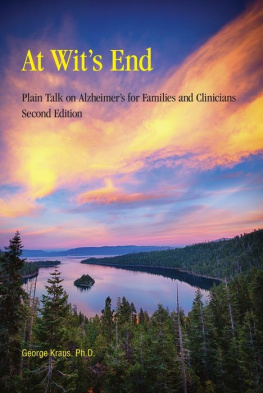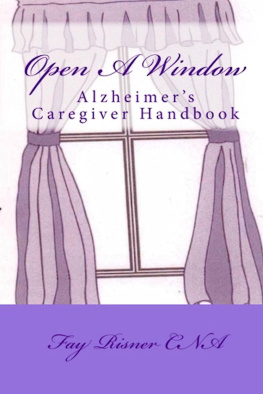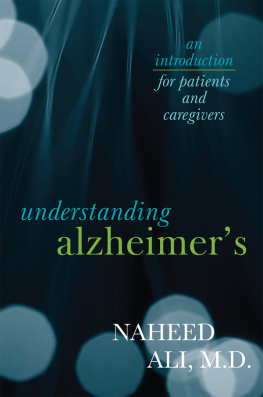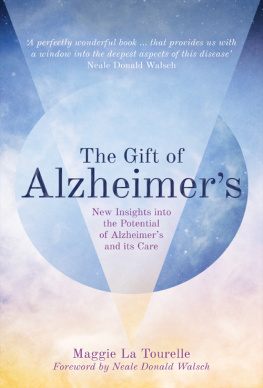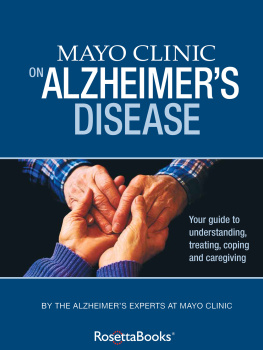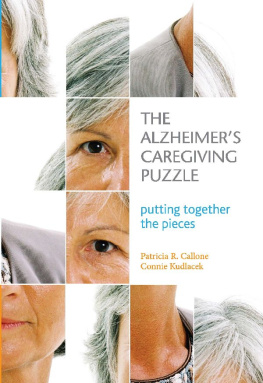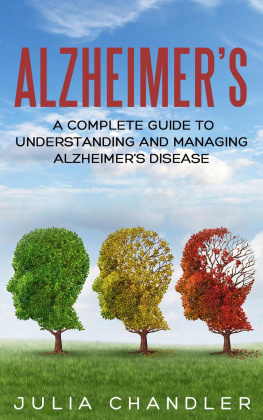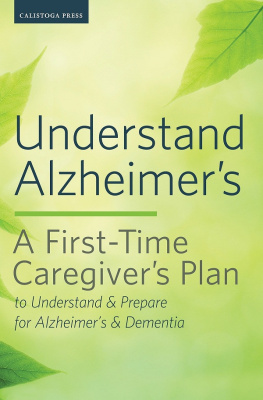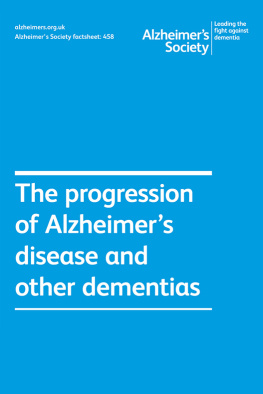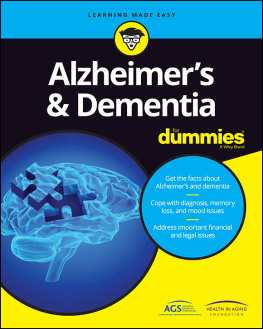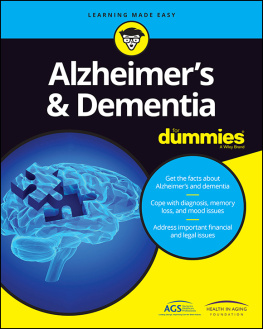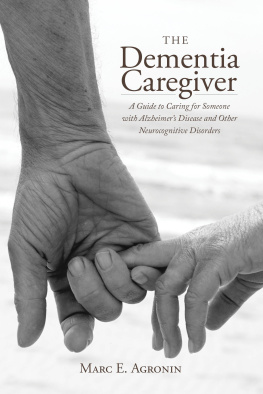George Kraus, Ph.D.
Copyright 2017 by Purdue University. All rights reserved.
Printed in the United States of America.
Names: Kraus, George, 1950- author.
Title: At wits end : plain talk on Alzheimers for families and clinicians / George Kraus, Ph.D.
Description: Second edition. | West Lafayette, Indiana : Purdue University Press, [2017] | Includes bibliographical references and index.
Identifiers: LCCN 2016016854| ISBN 9781557537676 (pbk. : alk. paper) | ISBN 9781612494708 (epdf) | ISBN 9781612494715 (epub)
Subjects: LCSH: Alzheimers disease.
Creating a book like this takes support, guidance, and a little inspiration, and I am so grateful for all the help Ive received. To all of my friends, colleagues, and family, thank you. You have contributed more than you know to this book and to my life.
Its a rare thing to find the kindness you want to give others reflected in someone else. To John Chang, Ph.D., of Wright State Universityfor providing me those many hours of consultation on the psychology of the elderly. The time we spent together was essential in developing my practice specialty as a geropsychologist. Your clinical expertise, friendship, and support have helped me set a sound foundation for my clinical work with Alzheimers patients.
Over the years that I have provided care and consulted to Livingston Care Center, I have worked with some incredible peopleSamuel Berger, Sharon Clay, Hilda Claypool, Brenda Cooper, Kara Crutcher, Jennifer Foley, Patty Free, Cynthia Gifford, Haitham Imam, Romona Pollard, Linda Riebe, Kim Schooler, Rischell Snow, Debbie Steward, Lynn Thurston, Vladimir Trakhter, Dale Valiquette, Barb Vocke, Amy Walters, and Luther Wright IIIthank you all for making me feel so welcome and appreciated. The stable center of my work there, though, has been Julie Upchurch, LSW, Director of Social Services, and two of her very finest assistants, Casandra Watson and Bo HobbsI am so very grateful for all your efforts in supporting my connection with your residents and making the time Ive spent at Livingston meaningful and fun. Finally, I want to offer my heartfelt gratitude to Bil Ferrar, Director of Social Services, of Patriot Ridge Community for your dedication and commitment to your residents there, and especially to Ann Wilder, Director of Activities, and Jackie Davis of Patriot Ridge Communitythank you both for the fine activities programming youve offered there. I also want to thank Jennifer Jenkins and Sue Holston of Tampico Terrace Care Center; Lydia Swagerty and Trisha Oliver of Rheem Valley Convalescent Hospital; and Sue Fordon and Karen Barnes-Jarvis of Hospice of the East Bay for all their help and support in welcoming and integrating me into my new California community.
To all the clinicians and staff of Layh and Associates of Yellow Springs, OhioJoyce Appell, LPC, Bruce Heckman, Ph.D., Casey Kelliher, Psy.D., Jim Kane, LPC, Lorena Kvalheim, Psy.D., Melissa Layman-Guadalupe, Ph.D., Kate LeVesconte, Psy.D., Kathi Lewis, Psy.D., Angela Branch, Katie Malone, and Ruth Willfongthanks for all the valuable help, feedback, and support you have offered me over the years. And Id like to give a special thanks to Jack Layh, Ph.D., your experience and indispensable assistance have been invaluable in helping me develop my practice as a psychologist.
To all the wonderful staff at the Greene County Libraries of Yellow Springs, OhioConnie Collett, Alan, Staiger, Rick Mickels, Pat Siemer, Peggy Townshend, Tricia Gelmini, Paul Cooper, Lyn Bobothanks for all the help and technical guidance in maneuvering through your world of information science, and especially to Amy Margolin of the Greene County Library of Xenia for tracking down the sea of interlibrary loan items I requested.
To all my colleagues at Midwest Behavioral Care of Dayton, OhioSteve Pearce, Psy.D., Deb Sowald, Psy.D., Phyllis Kuehnl-Walters, Ph.D., Gary Dixon, LISW, and Lee Wolfe, LPCCyour support and good advice helped me in so many ways to develop my practice and skills as a clinician. I want to thank Tina Bowers, Ruth Waymire, and especially Jennifer Shank and Tabby Masters for all the encouragement and fun you brought into my life working there as I wrote this book.
I want to thank David Goldberg, M.D., of Greene Memorial HospitalI really appreciated the support and encouragement you gave me when I first presented the seeds for this book at my Grand Rounds talk on dementia.
To Ed Klein, Ph.D., and Walt Stone, M.D., of the University of Cincinnati, thank you for all the sound academic advice, clinical pearls, and kind truths you gave me during my post-doctoral clinical training. You are two of my wise mentors, and it was such a gift to have been able to work with you.
To Gary Gemmill, Ph.D., and Celeste Sinton, M.D., mentors and emotional guides boththanks for teaching me just how much I can enjoy learning about my vulnerabilities and trusting myself. You each have brought me so much wisdom and faith in the process, and I will forever be grateful to you both.
To my Uncle Chickalthough you have long passed, I want to thank you so much for helping me begin to really see and like myself in ways I never had. Your book with Maxwell Maltz and that summer workshop, How to Live and Be Free Through Psychocybernetics, inspired me to pursue my passion for psychology. And to Aunt Shirley, thank you so much for all the loving guidance you have given me.
To my sisters, Pat and Bettyyour encouragement and love has been a silent undercurrent in all of my efforts here. Thank you, Pat, for your insightful suggestions and Betty, for your simple and beautiful artwork in the book. And to my parentssomewhere you are watching from above, reading this, and smiling with joy.
To my Aunt Peggy, our family historianyour love and encyclopedic knowledge of the genealogy of all the clinicians in our family has contributed to a strong sense of professional identity and connectedness to the traditions of my past. Your love and support have quietly helped me believe in myself.
To Tom Tuttle and Sandy Novak, thank you both for all your incredible insights and optimism. Your experience and wisdom made finding a publisher exciting and fun. And to Vivian Tuttle, my wonderful new mom, thanks for reviewing an early draft of the book and for all the love and silliness you bring into my life. Its great being in your family.
To my wife, Lori, and to all the special children in my lifeAurianna, Michael, Nancy, Nathan, Miles, Dee, and Axsyou have brightened my life in ways that go beyond words. I love you all very much.
To the late Margaret Hunt of Purdue University Press, thank you for all your editorial wisdom, patience, and faith in making At Wits End (2006) the very best it could be. I also want to thank Katherine Purple and Peter Froehlich for shepherding this new and updated edition along its way and Kelley Kimm, Bryan Shaffer, and Mary Beth Deitz for their invaluable assistance in this process.
To Jennifer Moye, Ph.D., ABPP, from VA Boston and Harvard Medical School, your editing suggestions were invaluable in making the second edition of At Wits End the very best it could be.
And finally, to all my elderly patients, who have taught me about the courage and dignity of living with Alzheimers. I feel a great deal of indebtedness to youfor the time you spent with me, for the courage you showed me, and for the wisdom you revealed to me.

